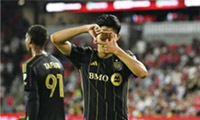On a blistering afternoon last June, outside a Polish social club, men in heavy wool tuxedos, with slicked-back hair and pencil-thin mustaches, were blotting their brows. Nearby were some very slender young women in spangly, ankle-length dresses. But because this was Brooklyn, where people wear weird clothes all the time, nobody paid them attention.
A few blocks away, a seaside boardwalk had miraculously arisen, complete with clubs, restaurants and snack vendors. Except that the shops were empty. And where the ocean should have been, there was, instead, a wall of metal shipping containers. This brand-new ghost town is the $5 million set for “Boardwalk Empire,” an HBO series that begins September 19.
“Boardwalk Empire” is set in Atlantic City, New Jersey, in 1920, during the first year of Prohibition, and the big outdoor set, the vintage clothing and historical research are all evidence of the unusual, painstaking lengths the show’s creators have gone to recreate a mostly unfamiliar era. Martin Scorsese directed the pilot episode and became an executive producer of the series.
Prohibition, which made the sale and manufacture of alcohol illegal, was tied both to the introduction of the income tax and universal suffrage, and radically altered the relation of citizen and government. “Prohibition is like a guilty secret, or an embarrassment,” said Daniel Okrent, a former public editor for The New York Times, who has just published a history of the period, “Last Call: The Rise and Fall of Prohibition.”
“How do you explain that for 13 years there was an amendment to the Constitution of the United States that said you couldn’t get a drink legally? It beggars the imagination.” “Boardwalk Empire” is based in part on a book by the same name . In 2006 HBO showed the book to Terence Winter, who wrote many “Sopranos” episodes for the network. “I’ve always loved the way people talked in the ‘20s, and the clothes, the cars,” he said.
“It was such a transitional period. The world was changing so much. And in some ways it was a very modern time. This was almost a hundred years ago, but they had airplanes, telephones, people went to the movies all the time.” Mr. Winter focused on the ‘20s and Enoch Johnson, known as Nucky, by far the most vivid character in the book.
Nucky was a political boss and stalwart of the Republican Party who from 1911 to 1941 controlled all the vice in Atlantic City. He occupied a whole floor of the Ritz-Carlton hotel, rising every day at 3 p.m. to travel in a powder- blue Rolls-Royce. The real Nucky was tall and broad-shouldered, with an enormous, domelike head.
In the show, fictionalized slightly as Nucky Thompson, he’s played by the bugeyed, slightly cadaverous Steve Buscemi, another “Sopranos” alumnus. “ My inspiration for Nucky was the Prince of Wales,” said John A. Dunn, the show’s costume designer, referring to the dandy who later became Edward VIII.
Mr. Dunn was standing recently in a storage room in a Brooklyn soundstage . Nucky’s suits were on a rack next to Al Capone’s and near Arnold Rothstein’s and Lucky Luciano’s. (They are also characters in “Boardwalk Empire.”) Mr. Dunn used vintage clothing, either rented or bought on eBay or in vintage clothing shops; otherwise the costumes were handmade.
“The great surprise for me was the color,” he said. “Because of photographs we tend to think of ‘20s clothing as black and white, but really there was this splash of new, bold color, maybe in reaction to World War I.” The show’s music, bright and ebullient, is also authentic and also a reaction to the end of the war. People wanted to get up and dance, as Mr. Okrent pointed out, and Prohibition, or the speakeasy culture, conveniently (and for the first time) mingled men, women and alcohol in an atmosphere of congenial illicitness.
Some of the show’s tunes haven’t been heard for close to a century. “Marty and Terry both wanted the music to be historically accurate,” said Randall Poster, the music coordinator for the series. “So we just immersed ourselves in this fascinating transitional period when ragtime is just beginning to turn into jazz. ” The research even extended to the way people talked and what they read in the ‘20s.
One of the characters is reading a novel by Henry James; another keeps a copy of Sinclair Lewis with him. “I hate to say it, but before TV people spoke better and were better read than we are,”
Mr. Winter said. “They were probably more literate.” And they also had their vices. “We have whiskey, wine, women, song and slot machines,” the real Nucky once said. “I won’t deny it, and I won’t apologize for it. If the majority of the people didn’t want them, they wouldn’t be profitable.”
스마터리빙
more [ 건강]
[ 건강]이제 혈관 건강도 챙기자!
[현대해운]우리 눈에 보이지 않기 때문에 혈관 건강을 챙기는 것은 결코 쉽지 않은데요. 여러분은 혈관 건강을 유지하기 위해 어떤 노력을 하시나요?
 [ 건강]
[ 건강]내 몸이 건강해지는 과일궁합
 [ 라이프]
[ 라이프]벌레야 물럿거라! 천연 해충제 만들기
 [ 건강]
[ 건강]혈압 낮추는데 좋은 식품
[현대해운]혈관 건강은 주로 노화가 진행되면서 지켜야 할 문제라고 인식되어 왔습니다. 최근 생활 패턴과 식생활의 변화로 혈관의 노화 진행이 빨라지고
사람·사람들
more많이 본 기사
- 초강경 추방 드라이브… 한인사회 불안… 1
- 트럼프 경제·이민 정책 지지율 급락
- 노화의 신호, 흰머리는 왜 생기나… … 1
- 부채증가 세계 최고… “상실감 위로한다며 1인당 60만원”
- ‘트럼프 골드카드’ 신청 시작 100만달러 내면 미 영주권
- ‘테라 사태’ 권도형 징역 15년
- 재외투표율 79.5%… 투표자 수 미국 최다
- DUI 차량, 애나하임 고교생 8명 덮쳐
- 이효리, 과거 인연도 소중.. ‘패밀리’ 김수로 만나 ‘다정’
- 이번 주말 ‘송년모임 대축제’… 단체·동문회 행사 절정
- 한국 교사 10명, 페어팩스 초등교 배치
- “마약밀매·인신매매 등 국제범죄 척결” ‘국토안보 태스크포스’ 뉴욕지부 출범
- 멕시코·한·중 등 FTA 미체결국 ‘관세폭탄’
- 김찬수씨, 포토맥 포럼에 2천달러 기부
- ‘숨은 나랏빚’ 국가보증채무, 내년 20조 넘게 늘어난다
- 김민선 학장 자선행사서 40만달러 기금조성
- ‘오바마케어 보조금’ 올해 말 종료 가능성 ↑ 커져
- 전도연 “얼굴 근육 가장 많이 써…자백의 대가 이리 클 줄은”
- LA 노인회 ‘팜스프링스 온천 투어’
- “멍청한 이민국” 트럼프 비판에… 미, 비자 개선 속도전
- 자녀들과 함께 세우는 부모님 자산 이전 계획
- [송년행사 화보] “친구야 반갑다… 선배님들 모두 건강하세요”
- 13일 추첨 파워볼 열풍 잭팟 10억달러 돌파
- 트럼프 이번엔 오른손등에 며칠째 반창고…백악관 “악수 탓”
- 찰리 커크 암살 용의자, 셔츠에 넥타이 매고 첫 법정 출두
- 포브스 ‘여성파워 100인’에 케데헌
- 한인 업소들, 이번 주말 ‘할인 대전’ 돌입
- “박나래 前매니저 5000만원 지급? 과한 수당 요구” 주장
- 검문 뚫고 목선 탈출… 마차도 ‘목숨 건’ 노벨평화상 참석
- “원만한 마무리 원해” 성시경, 10년 의리 배신한 전 매니저 ‘선처’
- 버크 레이크서 여친 살해한 남성 유죄 판결
- “성탄 분위기 망쳤다”…맥도날드, AI로 만든 광고 중단
- 삼성SDI, 미국서 2조원 ‘잭팟’… ESS 배터리 첫 수주
- ‘카지노 건립 반대 결의안’ 통과
- “ICE 뉴욕주 이민자단속 라틴계에 집중”
- [인터뷰] “한인 커뮤니티 지원하고 도움이 되는 협회될 것”
- 오바마케어 대체냐 연장이냐…상원서 與… 1
- 에어프레미아, 워싱턴 DC 신규 취항
- 고모의 유지 기려 3만불 기탁
- 빅애플, 불우이웃돕기 성금 5,000달러 전달
- 한인 참전용사 추방사유 논란
- 노던-48스트릿 ‘퀸즈 최악 교차로’
- 오픈뱅크, 장애인 특별달력 제작 화제
- “넷플릭스 신용등급 강등 위험”
- 송미숙 전 이사장 단독 출마
- “오바마케어 보조금 연장 대신 의료비 직접지원”
- ‘달인’ 김병만이 돌아온다..수제자 바뀌었네
- 뉴저지주 1회용 식기류도 퇴출 추진
- 소셜연금 VA 2,064불·MD 2,139불
- 트럼프 ‘대마초 규제 대폭 완화’ 행정명령 검토
1/5지식톡

-
 테슬라 자동차 시트커버 장착
0
테슬라 자동차 시트커버 장착
0테슬라 시트커버, 사놓고 아직 못 씌우셨죠?장착이 생각보다 쉽지 않습니다.20년 경력 전문가에게 맡기세요 — 깔끔하고 딱 맞게 장착해드립니다!장착비용:앞좌석: $40뒷좌석: $60앞·뒷좌석 …
-
 식당용 부탄가스
0
식당용 부탄가스
0식당용 부탄가스 홀세일 합니다 로스앤젤레스 다운타운 픽업 가능 안녕 하세요?강아지 & 고양이 모든 애완동물 / 반려동물 식품 & 모든 애완동물/반려동물 관련 제품들 전문적으로 홀세일/취급하는 회사 입니다 100% …
-
 ACSL 국제 컴퓨터 과학 대회, …
0
ACSL 국제 컴퓨터 과학 대회, …
0웹사이트 : www.eduspot.co.kr 카카오톡 상담하기 : https://pf.kakao.com/_BEQWxb블로그 : https://blog.naver.com/eduspotmain안녕하세요, 에듀스팟입니다…
-
 바디프렌드 안마의자 창고 리퍼브 세…
0
바디프렌드 안마의자 창고 리퍼브 세…
0거의 새제품급 리퍼브 안마의자 대방출 한다고 합니다!8월 23일(토)…24일(일) 단 이틀!특가 판매가Famille: $500 ~ $1,000Falcon: $1,500 ~ $2,500픽업 & 배송직접 픽업 가능LA…
-
 바디프렌드 안마의자 창고 리퍼브 세…
0
바디프렌드 안마의자 창고 리퍼브 세…
0거의 새제품급 리퍼브 안마의자 대방출 한다고 합니다!8월 23일(토)…24일(일) 단 이틀!특가 판매가Famille: $500 ~ $1,000Falcon: $1,500 ~ $2,500픽업 & 배송직접 픽업 가능LA…
케이타운 1번가
오피니언

22기 LA평통 출범에 거는 기대

연말 시즌 사기·범죄 경계해야
 메건 매카들 워싱턴포스트 칼럼니스트
메건 매카들 워싱턴포스트 칼럼니스트 [메건 매카들 칼럼] 장편영화의 마지막 챕터인가
 김미선 서북미문인협회 회장시인
김미선 서북미문인협회 회장시인 [한국춘추] 하늘을 계산한 사람들, 칠정산
 이희숙 시인·수필가
이희숙 시인·수필가 [금요단상] 그을린 자리에서 다시
 심상용 / 서울대 미술관장
심상용 / 서울대 미술관장 [미술 다시보기] 지옥에 대하여
 서정명 / 서울경제 기자
서정명 / 서울경제 기자[만화경] 주한미군과 ‘도련선 리스크’
 한 영 재미수필가협회 회장
한 영 재미수필가협회 회장 [한영의 독서칼럼] 불안한 사람들
 정영현 서울경제 테크성장부장
정영현 서울경제 테크성장부장 [여명] 콘크리트가 데이터가 됐을 뿐, 달라진 게 없다
1/3지사별 뉴스

“마약밀매·인신매매 등 국제범죄 척결” ‘국토안보 태스크포스’ 뉴욕지부 출범
연방 국토안보부가 10일 ‘국토안보 태스크포스’(HSTF) 뉴욕지부를 출범시켰다.HSTF는 마약 카르텔, 인신매매, 자금세탁, 갱단 등 국제범…
‘오바마케어 보조금’ 올해 말 종료 가능성 ↑ 커져

한국 교사 10명, 페어팩스 초등교 배치
‘글로벌 앰버서더 티처스 프로그램’(Global Ambassador Teachers Program)은 국제 교사 교환 프로그램 가운데 하나로 …
김찬수씨, 포토맥 포럼에 2천달러 기부

법원, ‘테라사태’ 사기혐의 권도형에 징역 15년 선고
스테이블코인 ‘테라USD’(이하 테라) 발행과 관련한 사기 등 혐의로 미국에서 형사재판을 받는 권도형(34) 테라폼랩스 설립자에게 법원이 징역…
해외 평통위원 10% 더 늘린다

오늘 하루 이 창 열지 않음 닫기 





















































.png)


댓글 안에 당신의 성숙함도 담아 주세요.
'오늘의 한마디'는 기사에 대하여 자신의 생각을 말하고 남의 생각을 들으며 서로 다양한 의견을 나누는 공간입니다. 그러나 간혹 불건전한 내용을 올리시는 분들이 계셔서 건전한 인터넷문화 정착을 위해 아래와 같은 운영원칙을 적용합니다.
자체 모니터링을 통해 아래에 해당하는 내용이 포함된 댓글이 발견되면 예고없이 삭제 조치를 하겠습니다.
불건전한 댓글을 올리거나, 이름에 비속어 및 상대방의 불쾌감을 주는 단어를 사용, 유명인 또는 특정 일반인을 사칭하는 경우 이용에 대한 차단 제재를 받을 수 있습니다. 차단될 경우, 일주일간 댓글을 달수 없게 됩니다.
명예훼손, 개인정보 유출, 욕설 등 법률에 위반되는 댓글은 관계 법령에 의거 민형사상 처벌을 받을 수 있으니 이용에 주의를 부탁드립니다.
Close
x